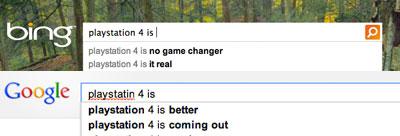When you start typing in a search online, you know how the engine's algorithm offers completion suggestions before you are even done? I've always thought they were legitimate, but now
I'm starting to think that there is some tinkering that goes on behind the scenes.
I'm not positive who first discovered this hilarious difference between Bing and Google
autocomplete suggestions, but The Atlantic wrote a story about
it yesterday, and cited tweeter @evlbzltyr.
Take a look below at the two autocomplete suggestions I got - the
same ones that @evlbzltyr and The Atlantic got:

advertisement
advertisement
The Atlantic was able to get in contact with both Microsoft and Google spokespeople. The Microsoft spokesperson told The Atlantic that they don't
manually alter results for autosuggest. The Google spokesperson told The Atlantic that their algorithm works similarly.
As The Atlantic pointed out, and as I discovered too,
eliminating the word "the" from the search yields similar results from both search engines. Is it possible that the "the" throws Bing's algorithm into a tizzy? Maybe.
Personally,
I'm not too quick to accept what the Microsoft spokesperson told The Atlantic about the results. I'm more inclined to think it was a real-time marketing attempt on their part; the difference between
the two results is just too stark. It also made me wonder: what other "suggestions" might we be getting that are actually marketing stabs?
The first thing I compared were Google
searches for Androids and iPhones. You also get similarly opposite results from Bing and Google when you swap out "Xbox One" with "Playstation 4."


So maybe those really are
genuine search results. And to be fair, I wasn't able to find endless examples of one search engine boosting themselves and putting down their competitor. Additionally, it's possible that the majority
of people using Bing are all Microsoft fans to begin with, which would make their searches naturally pro-Microsoft.
Regardless, color me skeptical. I think it's a clever (albeit
shady) way for these companies to do a little bit of real-time marketing for their products via their search engines.